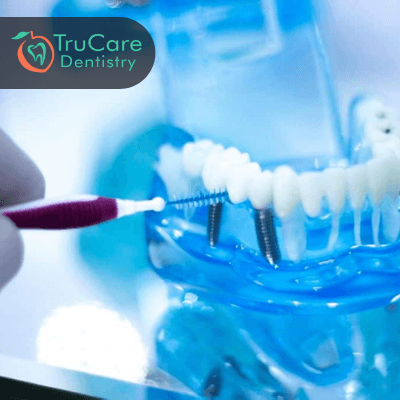Every year 3 million people in the United States have dental implants increasing by 500,000 every year. A dental implant is an excellent option for people who have lost one or more teeth. It also allows replacement teeth to look, feel, and function like natural teeth.
Cleaning and caring for dental implant dentistry are the key to maintaining their appearance and functionality over a long time. Failing to take proper care for your dental implant can increase the risk for peri-implantitis, an inflammatory condition that affects the soft and hard tissues surrounding the implant. Uncapped peri-implantitis leads to bone loss and dental implants.
How to Clean Single Implants
1. Use A Soft-Bristled Toothbrush
Soft bristles cause little damage to your gums and remove tartar and plaque then medium or hard bristles. Electric toothbrushes have been used to prevent and remove bacteria from teeth.
Manual toothbrushes produce a more significant number of brush strokes than a human hand. Whether you use a manual or electric brush, keep in mind that its bristles should be soft.
2. Brush At Least Twice Per Day
After waking up in the morning, brushing eliminates morning breath and removes bacteria formed in the mouth overnight. Brushing before bed removes bacteria that build up throughout the day and reduces the risk of plaque buildup and decay overnight.
3. Use A Water Flosser
A water flosser prevents and removes bacteria from a pocket up to the depth of 4 mm. It does not replace regular floss. Aggressive use of water floss can create gum recession and periodontal abscess in people with periodontitis.
4. Use Crown And Bridge Floss
Crown and bridge floss are specifically designed to scrub under and around the dental implant dentistry. Rigid ends enable you to insert the floss between dental implants on the gumline and pull it to the other side. You can then bend it against the surface of the implant-supported denture and rub it in the side.
5. Use Low-Abrasive Toothpaste
People who lack abrasive elements should use toothpaste that uses baking soda and stain remover agents. These materials can wear on acrylic and remove the glaze from porcelain implant supported dentures.
6. Brush Under And Around The Dental Implant Crown
Bacteria and plaque may accumulate below and around the implant supported dentures crown to increase the risk for peri-implantitis. To access these areas, try using an angle-necked toothbrush or an inter-brush with a thin head.
How to Clean All-on-4 Implants
In all-on-4 dental implant dentistry, dentistry users also have to follow the same steps as those used to clean a single tooth implant. But only a few more steps have to be added, which is further explained below:
1. Use A Rubber-Tip Stimulator
Water flossers come with rubber-tip steelers that can gently remove food particles trapped between the bridge and the gum line. Use this attachment on your water flosser at least once per day to remove food debris and bacteria from all-on-4.
2. Use A Sulcus Brush
A sulcus brush is about one-third of a regular toothbrush width and is useful in cleaning the part of the bridge that transitions into soft tissue.
How to Clean Overdentures
1. Brush Overdentures Daily
Use a denture brush to gently brush your overdenture’s underscores at least once per day. A denture brush typically has two heads: a soft-bristled flat head for smooth surfaces and a single-tuft head with taped bristles that can reach hard-to-reach areas. Do not use toothpaste as it may scratch the surface of the overdenture due to a dull finish.
2. Soak Dentures Overnight
When you go to bed, place your overdenture in a cleaning solution specifically made for dentures, and soak them overnight. This will keep your overdentures clean and can also help them maintain their shape.
3. Rinse Thoroughly With Water
Rub your overdenture thoroughly with water before placing it back in your mouth. It reduces the risk for side effects after pain resolution, burning, and vomiting when soaked in the overdenture cleaning solution.
4. Inspect Your Overdentures Regularly
Inspect your overdenture every day carefully to ensure the O-ring, locator cap, and clip are in place and in good condition. Consult your dentist immediately if any of these parts look bad or are missing.
Final words
Implant supported dentures may not decay excessively, but your gums and supporting bone remain subject to proper dental implant dentistry care without bacteria decay, inflammation, and infection.
After doing a dental implant, you should regularly do a deep cleaning and regular checkup from a dentist. Never use an abrasive cleaning product and hot water to clean teeth, and never use or chew hard foods or items.

